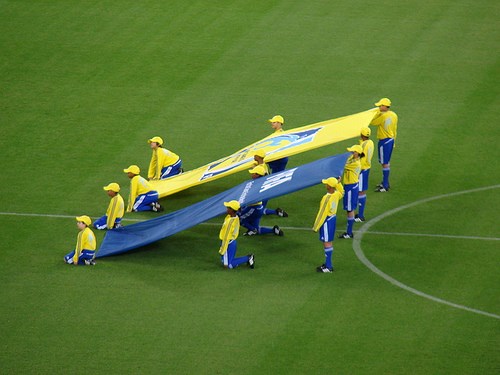Volunteers tackle World Cup work

FIFA volunteers. Photo (c) flickr user DR.ZVLV and licensed under a Creative Commons 2.0 licence.
30.06.2010
By Miko SchneiderFor the 2010 World Cup, 67,999 volunteer applications from 170 countries were received - an average of 1,600 applications a day. Out of those applications, 15,000 volunteers were selected to make up the Local Organising Committee (LOC) volunteer force, and an additional 3,000 were selected as Host City volunteers.
Three thousand international volunteers applied via their South African embassies and were trained online. Some of them had previous experience at the 2006 World Cup in Germany, or the 2008 Beijing/2010 Vancouver Olympics.
These enthusiastic individuals come from all races, income groups, personalities, backgrounds, skill sets and ages - the oldest volunteer in South Africa is 79-year-old Daya Amrit.
Comprehensive training programme
Volunteer work encompasses everything from welcome and information services, to spectator services, language support for the hearing impaired, administrative support, Fan Park services, media, telecommunications and information technology services. Volunteers receive a stipend of R100 (approximately €11) a day and lunch coupons, but none of their travel costs are covered.
"Volunteers are absolutely integral to the success of the tournament, and their training programme is critical to us at the organising committee," said Danny Jordaan, CEO of the LOC.
The training programme included ‘general training and philosophy necessary to prepare them for working in the organisational structures of the tournament’, as well as training within their specific areas, ‘know your city’ training, and motivation sessions where volunteers learned the Diski dance.
Welcoming FIFA ‘familiy members’
Cape Town-based Idafay Mervis is a FIFA Welcome and Information volunteer based at Cape Town International airport. Her job entails meeting, greeting and facilitating FIFA ‘family members’, including executives, referees, player support staff, wives and girlfriends, press, and foreign volunteers.
In between VIP arrivals, she helps local fans and tourists, even though it is not part of her job description: “I do think that, in our section at least, they overestimated how many volunteers they needed… [although] it is great fun having access to the stadium and clearance to go to all parts of the airport. I think the exciting part is seeing people in large groups like Mexicans, etc, so enthusiastic to be here and so excited by our country, one does feel proud.”
The Asian ‘fans volunteer army’
Then there are the ‘unofficial’ volunteers – 300 Chinese and a few hand-picked North Korean ’rent-a-crowd’ fans were paid by the North Korean Sports Ministry and hired by a Chinese PR agency to fly to South Africa and cheer on their Asian neighbours. The ‘fans volunteer army’, including Chinese artists, dancers and popular singers, were dressed in red to lend their support to lowest-ranked team in their opening match against Brazil. The volunteer fans sang the national anthem of the Democratic People's Republic of North Korea, and were seen cheering when instructed to by a ‘conductor’.
Most North Koreans were not able to secure visas to leave the country, if they could afford to travel to South Africa at all. In addition, North Korean team members did not speak to the media, and matches were only broadcast to the North Korean public with leader Kim Jong-il’s permission.
Whether official or unofficial, host city or FIFA-based, local or international, the 2010 World Cup volunteers demonstrate a commitment to their work and a desire to show the best possible face to the public and the media.
The greatest strength of the volunteer programme, however, lies in the up-skilling of previously unskilled South Africans who can now say they are ready to seek full-time employment in the country’s grueling job market.





